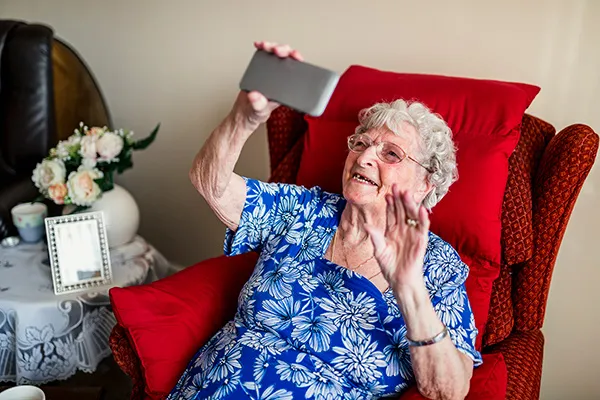Keeping up with doctor’s appointments is essential to managing health and staying informed, but it can often feel overwhelming. From scheduling and transportation to understanding medical advice and ensuring proper follow-up, there are many details to manage. This is where Understood Care can help. Our advocates serve as trusted guides, working alongside you or your loved one to make the process easier, more organized, and more comfortable.
Personalized Support Before and After Every Appointment
Understood Care advocates provide hands-on help with all aspects of medical visits. We help you schedule appointments, confirm provider information, and prepare for the visit itself. This might include reviewing your questions ahead of time, making sure prescriptions are current, or gathering any medical records needed. After the appointment, we help you understand the doctor’s recommendations and take the right steps to follow through on care instructions, referrals, or additional tests.
A Partner to Help You Understand Your Care
Medical visits can involve unfamiliar language, new diagnoses, or complex treatment plans. Your advocate is there to help translate this information into clear, understandable terms. We make sure you feel confident about what was discussed during the visit and that you know what actions to take next. If something is unclear or left unanswered, your advocate can follow up with your provider to get the information you need.
Coordination Across Your Care Team
Many people receive care from more than one doctor. Your advocate helps ensure that your care is well coordinated across primary care providers, specialists, and other professionals. We help share information between offices, keep records consistent, and make sure appointments align with your overall care goals. This reduces confusion and helps prevent important details from being overlooked.
Support for Getting to and From the Appointment
Transportation should never be the reason you miss a doctor’s visit. Your advocate helps you arrange reliable ways to get to and from appointments. Whether that means booking a ride service, coordinating with a caregiver, or finding community transportation resources, we make sure you have safe and timely access to care. We also consider mobility needs, language assistance, and other accessibility factors to support your comfort and safety.
Emotional and Practical Support Throughout
Doctor’s visits can bring up feelings of stress, uncertainty, or fatigue, especially when managing long-term conditions or complex health needs. Understood Care advocates are here to offer steady support throughout the experience. We are here to listen, provide encouragement, and help you make informed decisions without feeling overwhelmed.
Confidence in Every Step of the Journey
With Understood Care, you are never alone in managing your medical appointments. From the moment you schedule your visit to the follow-up that comes afterward, your advocate is there to help you stay organized, prepared, and empowered. We make it easier to stay connected to the care you need and to move forward with confidence.
Introduction
Compassionate caregiver support for respite, Medicare benefits, stress, coordination, transport, bills, and applications so you can care with confidence.
What caregiver support can include
Respite and daily breaks
Short breaks protect your energy and allow you to continue caring with patience and safety. Depending on your situation and coverage, respite time can happen in different settings. Your advocate can help you understand what is available in your area and what your plan covers, then set up services and keep them on a predictable schedule. Some families prefer a few hours several days per week. Others plan a short overnight break during a tough phase of care. Coverage details appear later in this guide.
Appointments and care coordination
Keeping track of visits, referrals, and follow ups is a full time job. An advocate can help you find in network clinicians, book appointments, plan reminders, and share updates across the care team so nothing is missed. Learn more at https://understoodcare.com/care-types/appointments and https://understoodcare.com/care-types/care-coordination
Medication access and cost support
If refills, prior authorizations, or copay costs are wearing you down, an advocate can review the plan formulary, request renewals, and look for savings so you can focus on care instead of phone trees. See https://understoodcare.com/care-types/lower-costs-of-medication and https://understoodcare.com/care-types/analyze-bills
Transportation
Reliable rides reduce missed visits and stress for everyone. Your advocate can set up accessible transportation, match the right vehicle to mobility needs, and confirm pickup details. Learn more at https://understoodcare.com/care-types/transportation-help
Home care and mobility equipment
You may need help with daily activities or safe transfers. Advocates can help you explore in home support options and durable medical equipment, gather required paperwork, and coordinate delivery. See https://understoodcare.com/care-types/home-care and https://understoodcare.com/care-types/mobility-equipment
Support for specific conditions
If you are caring for someone with a chronic condition, your advocate can connect services and simplify steps.
- Arthritis support https://understoodcare.com/care-types/arthritis-support
- Chronic care planning https://understoodcare.com/care-types/chronic-care
- COPD support https://understoodcare.com/care-types/copd-support
- Depression and mental health coordination https://understoodcare.com/care-types/depression
- Diabetes navigation https://understoodcare.com/care-types/diabetes
- Disability support and resources https://understoodcare.com/care-types/disability
- Heart disease support https://understoodcare.com/care-types/heart-disease
- Kidney disease support https://understoodcare.com/care-types/kidney-disease-support
- Lupus support https://understoodcare.com/care-types/lopus
- Neuropathy support https://understoodcare.com/care-types/neuropathy
- Osteoporosis support https://understoodcare.com/care-types/osteoporosis-support
- Stroke recovery https://understoodcare.com/care-types/stroke-recovery
- Social support and community connections https://understoodcare.com/care-types/social-support
Clear communication and second opinions
If you need help preparing questions, collecting records, or organizing choices, an advocate can keep everyone informed and help you compare recommendations. Learn more at https://understoodcare.com/care-types/communication and https://understoodcare.com/care-types/second-opinion

Coverage basics for caregiver support
Caregiver related benefits depend on the medical need, where care is provided, and your type of Medicare coverage. An advocate can help you confirm benefits and any costs before services start.
Traditional Medicare and home health
Medicare covers home health services when they are medically necessary and you meet program rules. Skilled services must be part time or intermittent, and the person must be considered homebound under Medicare rules. When skilled care is covered, a home health aide may help with personal care as part of the plan of care. Coverage is not the same as long term custodial care. Your home health agency must be Medicare certified.
Hospice and short term respite
If your loved one elects the Medicare hospice benefit, inpatient respite can be covered for up to five days at a time on an occasional basis when the usual caregiver needs rest. The hospice team arranges the stay in a hospice facility, hospital, or nursing facility that contracts with the hospice. There can be a small coinsurance for inpatient respite.
Medicare Advantage supplemental benefits
Many Medicare Advantage plans can offer extra supports for people with chronic illness. These are called special supplemental benefits for the chronically ill and may include in home support services, caregiver focused help, and other non clinical supports when they are expected to improve or maintain health or function. These benefits vary by plan and by enrollee eligibility, so it is important to confirm details with your plan. Recent rules continue to refine what is allowed and clarify guardrails for these benefits.
What long term custodial care means
Medicare does not cover long term custodial care such as ongoing help with dressing, bathing, and meals when this is the only care needed. Other programs, such as Medicaid or state programs, may help with long term services and supports depending on eligibility.
Your well being matters
Why breaks protect your health
Caregiving is linked with higher rates of frequent mental distress and depression compared with noncaregivers. Many caregivers also live with chronic conditions of their own. These patterns were seen in national public health data and underscore the need for regular rest, support, and clinical follow up for you.
Simple steps you can start this week
- Give yourself permission to rest. Short breaks and regular respite reduce stress and help you stay patient and safe. The National Institute on Aging encourages making time for activities you enjoy and keeping up with your own health appointments
- Move your body most days. Even a short walk can boost mood and energy and improve sleep quality
- Connect with other people. Support groups and time with friends reduce isolation and help you problem solve with people who understand caregiving
- Plan for safety. Learn fall prevention basics and create a simple home checklist that reduces hazards for the person you care for
- Share the load. Ask family and friends for specific tasks like a weekly meal, a visit, or help with errands. Long distance helpers can take on scheduling and bill payment tasks to relieve your day to day burden
When the person you care for has dementia
Caring for someone with dementia can bring unique challenges with communication, behavior changes, hospital visits, and evening restlessness. Practical strategies can ease daily life, such as keeping a consistent routine, reducing noise and clutter, and preparing for appointments in advance. You can learn step by step tips from trusted dementia resources and get coaching from an advocate.

How an advocate lightens the load
You should not have to do this alone. At Understood Care, an advocate listens to your goals, builds a clear plan with you, and handles the legwork so you have real time for yourself.
- Create a simple plan and handle logistics. We schedule and track visits, coordinate reminders, and keep your clinicians connected so you can focus on your relationship instead of the calendar. Learn more at https://understoodcare.com/care-types/care-coordination and https://understoodcare.com/care-types/appointments
- Lower the cost and confusion. We review bills in plain language, help you understand what you owe, and look for savings on prescriptions so your budget feels predictable. See https://understoodcare.com/care-types/analyze-bills and https://understoodcare.com/care-types/lower-costs-of-medication
- Guide applications. We help you complete forms for financial aid, disability benefits, transportation programs, and supportive services with fewer delays. See https://understoodcare.com/care-types/application-help
- Keep your support circle informed. We share updates with the care team and family you choose to involve, and we prepare questions for second opinions when you want more clarity. See https://understoodcare.com/care-types/communication and https://understoodcare.com/care-types/second-opinion
- Connect daily supports. We arrange transportation, in home help, and equipment so home feels safer and your routine is easier to follow. See https://understoodcare.com/care-types/transportation-help and https://understoodcare.com/care-types/mobility-equipment
A message from the video
You may have heard Debbie from Understood Care share this reminder. There are programs where if you are a full time caregiver for someone, we can help arrange a caregiver to come for a few hours a day on several days of the week so you can run errands, take care of yourself, visit friends, have lunch or dinner, and even take a vacation. Caregiving can feel overwhelming depending on the diagnosis, number of doctors, and medications. You are not alone. Under Medicare and Medicare Advantage benefits there are caregiver related benefits that may be paid for. We can help you find services so you can still have time for yourself. That is the heart of caregiver support
Getting started
If you would like help, you can book a dedicated time to speak with an advocate at https://app.understoodcare.com We will confirm your coverage, explain any costs before services begin, and build a plan that gives you room to breathe.

FAQ
- What is caregiver support and who is it for?
Caregiver support is for anyone helping a loved one with health needs, chronic illness, disability, or dementia. It includes respite breaks, help with appointments and paperwork, understanding Medicare and Medicare Advantage benefits, arranging transportation and home care, and managing stress so you can care with more confidence and less burnout. - What kinds of respite and breaks can I get as a caregiver?
Respite can look like a few hours of help several days per week, an aide who comes during difficult parts of the day, or a short overnight stay so you can rest or travel. Depending on your coverage and local services, respite may be provided in the home, at an adult day center, or in a facility. An advocate can help you see what your plan covers and set up breaks on a predictable schedule. - How can an advocate help with appointments and care coordination?
An advocate can find in network clinicians, book visits, help you prepare questions, set reminders, and share updates with the care team so tests, referrals, and follow ups do not fall through the cracks. This makes it easier to keep multiple specialists, primary care, and home services aligned. - What support is available for medications and costs?
If refills, prior authorizations, or copays are wearing you down, an advocate can review the drug formulary, coordinate renewals with your clinicians, request prior authorizations, and look for savings programs. They can also help review medical bills in plain language, explain what you owe, and flag or appeal possible errors. - Can I get help with transportation, home care, and equipment?
Yes. Advocates can arrange accessible rides for medical visits and community activities, match the right vehicle to mobility needs, and confirm pickup details. They can also help compare home care agencies, coordinate in home aides, and gather paperwork for durable medical equipment like walkers, wheelchairs, and hospital beds. - Is there support for specific chronic conditions?
If you are caring for someone with arthritis, COPD, diabetes, heart or kidney disease, neuropathy, osteoporosis, stroke recovery, disability, depression, or other chronic conditions, an advocate can connect you to condition specific care, education, and community resources. They help link specialists, primary care, and home supports so the plan feels less scattered. - How can an advocate help with communication and second opinions?
An advocate can help you prepare questions, organize records, and summarize concerns before appointments. If you want a second opinion, they can help you find an in network specialist, schedule the visit, and share relevant records so you do not have to repeat every detail. They can also keep chosen family members informed with clear updates. - What does Medicare cover related to caregiver support?
Medicare may cover home health services when medical and homebound criteria are met, including part time skilled nursing, therapy, and home health aides as part of a plan of care. Under the hospice benefit, short term inpatient respite can be covered for up to five days at a time to give caregivers rest. Many Medicare Advantage plans can offer extra supports such as in home help or caregiver focused services for people with chronic illness, but details vary by plan. - What is long term custodial care and does Medicare pay for it?
Long term custodial care means ongoing help with daily activities such as bathing, dressing, meals, and supervision when this is the main need. Traditional Medicare does not cover this type of long term care. Other programs, like Medicaid or state based services, may help depending on eligibility. An advocate can guide you through applications and program options. - Why are breaks and self care so important for caregivers?
Caregiving is linked with higher rates of mental distress and depression, and many caregivers have health conditions of their own. Regular breaks, movement, connection with others, and keeping up with your own medical care protect your physical and emotional health. Sharing tasks with family and friends, even in small ways, helps prevent burnout and improves safety for both you and the person you care for. - What if the person I care for has dementia?
Dementia care often brings extra challenges with communication, behavior changes, wandering, hospital visits, and evening restlessness. Practical strategies include keeping a consistent routine, simplifying the environment, reducing noise and clutter, and preparing for appointments in advance. An advocate can connect you with dementia specific resources, coaching, and respite so you are not managing these issues alone. - How does an advocate lighten my day to day load?
An advocate listens to your goals, builds a realistic plan, and handles much of the logistics. They schedule and track visits, coordinate reminders, check coverage, review bills, look for medication savings, guide applications for financial aid or disability benefits, arrange transportation and in home help, and keep your chosen support circle informed. Their role is to make sure you have time and energy left for yourself and your relationship with the person you care for. - How do I get started with caregiver support through Understood Care?
You can book time with an advocate online, review your coverage together, and discuss any potential costs before services begin. From there, you and your advocate build a plan that includes respite, coordination, and practical supports so you can care for your loved one and yourself with more confidence and breathing room.
References
- Medicare Hospice Benefits booklet PDF
https://www.medicare.gov/publications/02154-medicare-hospice-benefits.pdf - Hospice care coverage page
https://www.medicare.gov/coverage/hospice-care - Medicare home health services coverage page
https://www.medicare.gov/coverage/home-health-services - Medicare and Home Health Care booklet PDF
https://www.medicare.gov/publications/10969-medicare-and-home-health-care.pdf - Medicare long term care coverage explanation
https://www.medicare.gov/coverage/long-term-care - Medicare Advantage and special supplemental benefits for the chronically ill fact sheet
https://www.cms.gov/newsroom/fact-sheets/contract-year-2025-medicare-advantage-and-part-d-final-rule-cms-4205-f - Contract Year 2026 Medicare Advantage policy changes overview
https://www.cms.gov/newsroom/fact-sheets/contract-year-2026-policy-and-technical-changes-medicare-advantage-program-medicare-prescription-final - Caregiving tips for taking care of yourself
https://www.nia.nih.gov/health/caregiving/taking-care-yourself-tips-caregivers - Caregiving overview and resources
https://www.nia.nih.gov/health/caregiving - CDC MMWR changes in caregiver health indicators
https://www.cdc.gov/mmwr/volumes/73/wr/mm7334a2.htm - CDC MMWR caregiver health indicators PDF
https://www.cdc.gov/mmwr/volumes/73/wr/pdfs/mm7334a2-H.pdf - CDC caregiving overview
https://www.cdc.gov/caregiving/about/index.html - CDC caregivers and fall prevention
https://www.cdc.gov/still-going-strong/caregivers/index.html - Mayo Clinic caregiver stress overview and tips
https://www.mayoclinic.org/healthy-lifestyle/stress-management/in-depth/caregiver-stress/art-20044784 - Cleveland Clinic caregiver burnout overview
https://my.clevelandclinic.org/health/diseases/9225-caregiver-burnout - Exercise and stress
https://www.mayoclinic.org/healthy-lifestyle/stress-management/in-depth/exercise-and-stress/art-20044469 - NIA dementia caregiving guides
https://www.nia.nih.gov/health/alzheimers-caregiving/alzheimers-caregiving-caring-yourself
https://www.nia.nih.gov/health/alzheimers-changes-behavior-and-communication/alzheimers-caregiving-managing-personality-and
https://www.nia.nih.gov/health/alzheimers-changes-behavior-and-communication/coping-agitation-aggression-and-sundowning
This content is educational and is not a substitute for medical advice. Always consult your healthcare provider for personalized care.
Want a patient advocate by your side?
Quick & EasyMeet a supporting physician today for your 20-minute intake session.
Personal SupportAt Understood Care, you're seen, heard, and cared for.






